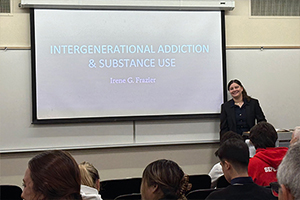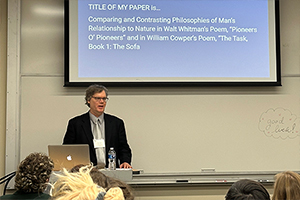Seeking Answers to the Unknown | Student Researchers Present at Stanford Honors Symposium


Psychology student Irene Frazier didn’t set out to make a new discovery in the addiction field. But a chance observation while working on an unrelated West Valley College class assignment presented her with an ah-ha moment—and sparked research and results she’ll soon present formally at the 2024 Honors Research Symposium at Stanford University.
Frazier and WVC students Terry Haggin and Jasreet Kaur Keith will unveil fresh research findings in disciplines including psychology and public policy, economics and an interdisciplinary humanities mix.
“We are proud of Irene, Terry and Jasreet for their selection to the Honors Research Symposium, a selective program that affirms and celebrates high quality research by some of the state's most academically talented community college students," said WVC Provost and Vice President of Academic Affairs Joshua Moon-Johnson. "Their achievements also highlight the strength of support and academic rigor provided to them as members of the WVC Honors University Transfer Program."
Only about one-third of the 241 applicants who submitted proposals were invited to present at the symposium, sponsored annually by the Bay Honors Consortium. The consortium promotes and supports honors programs at 16 northern and central California community colleges and requires symposium presenters to be members of their college honors program.
At WVC, the Honors University Transfer Program provides highly motivated students the opportunity to work closely with instructors and other motivated students—often in smaller classes—in advanced levels of critical thinking, analysis, research, writing and communication. Those who are interested also receive priority consideration for transfer to UCLA.
“Our honors students willingly choose to take more rigorous courses and voluntarily conduct research beyond course and degree requirements,” Moon-Johnson said.
Calling WVC the “best junior college in California,” English honors major Haggin expressed excitement at the opportunity to discuss his research at the symposium.
“I want to enlighten people as to why and how we should be protecting our precious planet and also to make people aware of some of the misconceptions that religion has brought to the world,” Haggin said.
Viewed through the lenses of history, English and religion, his research examined the 19th-century philosophy of Manifest Destiny that claimed the U.S. was destined, by God, to expand to the Pacific. One startling finding: advocates of Manifest Destiny relied on a faulty biblical translation that they misinterpreted as “subdue the land” to justify actions from felling forests to “extracting everything” they could from the earth, Haggin said.
“However, the correct Hebrew translation actually means ‘tend and nurture’ God's creations,” he explained. “So, my proposal was that the environment was being destroyed on an incorrect and false religious basis.”
Haggin continues pursuing his interest through a nonprofit he created called Stop Global Destruction.
Frazier’s research seeks solutions to stopping a different form of destruction: addiction.
While conducting interviews about aging with community members for a Human Growth and Development course, she spoke to a man—now sober—who struggled throughout his life against alcohol and substance abuse starting from age 3.
“I made the observation that this almost seemed like a ‘mimicking’ behavior; that is, a child replicating the behaviors they observed in their parents,” Frazier said. Her paper for the course earned an A.
But after the semester ended, her questions lingered: “Was what I was observing solely a one-off or is this a representative issue? I couldn't find any literature directly addressing this question, and so I decided to create it,” she said.
The result: a thoroughly researched interdisciplinary project that evolved into a close collaboration with WVC honors program alum Ishaan S. Prasad, who now studies public policy at UCLA. Prasad, too, is an Honors Research Symposium alum and encouraged Frazier to apply.
